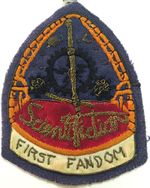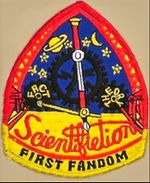First Fandom
Confusingly, there are several groups called “First Fandom”:
- The historical First Fandom, which encompasses anyone involved in sf-related activity from the late 1920s through the first Worldcon in 1939 — though sercon fanhistorians may stick strictly to the period Jack Speer defined below.
- A club made up of a subset of those fans. And,
- A descendant club that lets in anybody who’s been active in the sf community for 30 years. Members of this last especially like to conflate the groups.
- The First Fandom Foundation, a regrouping of the descendent club.
Contents
(1) The Earliest Fans[edit]
In his theory of Numerical Fandoms, Jack Speer defined First Fandom as the fannish era of 1933 through 1936. However, the term has come to encompass fandom from its earliest days — including what Speer called Eofandom, the founding of the Science Fiction League and the Scienceers in the late 1920s — through the late 1930s.
Anyone involved in the microcosm, in any form of fanac, up through the first Worldcon in 1939 is now considered to be a member (and is so tagged herein).
As far as we know, centenarian gafiate Trudy Kuslan is the last survivor. Bob Madle, who died in October 2022, was the last who remained active in fandom.
See List of First Fandom members, Most Senior Fan.
| From Fancyclopedia 1, ca. 1944 |
| (Speer) - The period up to 1936. It was marked by interest primarily in science and science-fiction. Fanzine material consisted mainly of forecasts of lineups in the pros, interviews with prominent authors, fan fiction relating to the pros, fan science fiction, novelty fiction by groups of pro writers, new advances in science, discussions of why s-f is in a rut or sex in science-fiction or the relative important of plausibility and good style. Douglas Webster uses the term to indicate the first fans of Great Britain; Carnell, Gillings, Hanson, Mayer, et al. who continued dominant into 1938, and were mainly interested in the aforementioned subjects, and also in sociological questions. |
(2) The Club, First Fandom[edit]
A club for members of the first group. Formed in 1959, the club was the brainchild of a group of Midwestern fans consisting of C. L. Barrett, MD., Don Ford, Lynn Hickman, Bob Madle, and Lou Tabakow.
In its early literature, it described itself as:
A fun-loving organization like the Shriners and Cooties. And First Fandom is for the old-timers. The date of December 31, 1937 has arbitrarily been made the cut-off date. Anyone who can show any connection with any aspect of science fiction fandom prior to that date is eligible for membership.
Lynn Hickman published the First Fandom Bulletin (aka First Fandom Magazine) in the 1960s, and Dave Kyle published First Fandom News Letter in the ’80s and ’90s. It presented the First Fandom Hall of Fame Award.
They had a distinctive triangular membership patch, with an emblem taken from the Frank R. Paul cover of the September 1928 issue of Amazing Stories, and the motto, "First Fandom is not dead, only doddering," which has been attributed to Bob Tucker.
| From Fancyclopedia 2, ca. 1959 |
| No direct relation to the era. Don Ford, Bob Madle and some others organized this group too close to our deadline for any of its activities to become evident. Its membership is restricted to folk who indulged in any sort of fanac before 1938, and apparently it is intended as an historical and continuity-maintaining group. |
(3) The Modern Club[edit]
The group calling itself "First Fandom" today is descended from that First Fandom club, but no longer has any true First Fandomites as members and long ago abandoned the requirement of actually having been active during the First Fandom era.
Membership formerly encompassed "dinosaurs," those very few fans left who engaged in fannish activities up through the first Worldcon, which was held over the July 4, 1939, weekend, and "associate members," who have been active in fandom for at least 30 years.
The club continues the First Fandom Hall of Fame Award for contributions to the field of science fiction -- whether as a fan, writer, editor, artist, agent or combination -- dating back more than 30 years, and the Sam Moskowitz Archive Award for excellence in science fiction collecting. They are usually presented annually during the Hugo Awards ceremony at Worldcons.
The current president of the club and editor/publisher of Scientifiction: The First Fandom Report, a quarterly club newsletter, is John L. Coker III. Jon D. Swartz and Coker are the editors of the First Fandom Annual, published since 2016.
(4) The First Fandom Foundation[edit]
An announcement sent to current members of #3 in June 2024:
By now, you should be aware that the last founding member of First Fandom, Bob Madle, is no longer with us. With Bob’s passing, it is time for First Fandom to modify itself from a group composed of those original science fiction fans to a group that continues to honor science fiction fandom and its growth into the thriving community it has become. Part of this evolution is to modify the name of the group from First Fandom to First Fandom Foundation. As part of this change, I [[[Todd Dashoff]]] have agreed to assume the position of Treasurer, taking over from Keith Stokes, who gave many years of service to the organization and continues to be an active participant. As dues had remained static for many years while inflation has affected the cost of all of the items necessary to run the organization, it becomes necessary to increase the annual dues fee from $15 to $20. You are receiving this notice because while you are listed as a member of First Fandom, you are not current with your dues payments. If you do not remedy this situation by July 31, 2024, or provide us with an appropriate reason for your inability to pay your annual dues, we will be forced to drop you from the membership list until such time as payment is received.
| Fanhistory | 1920s— |
| This is a fanhistory page. Please add more detail. |

